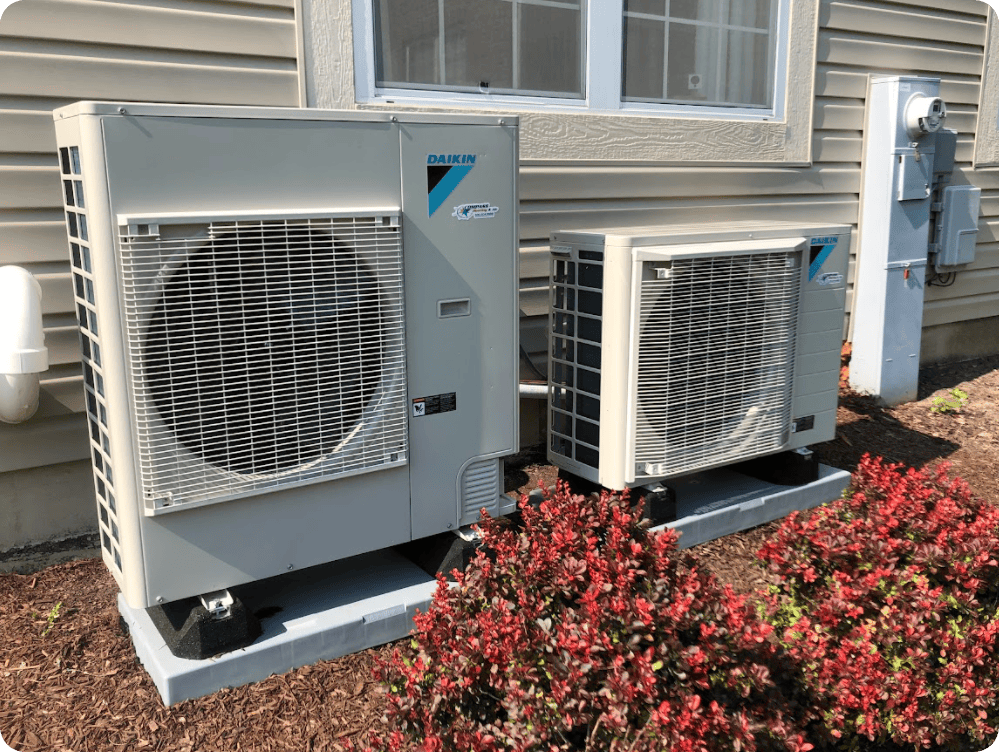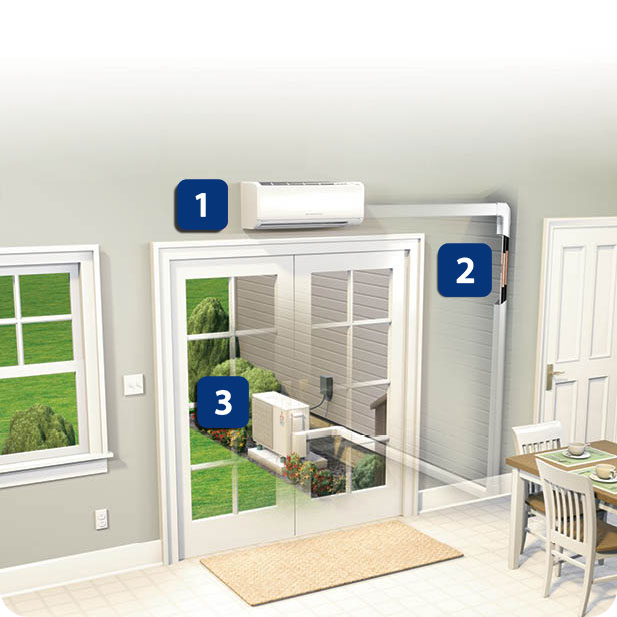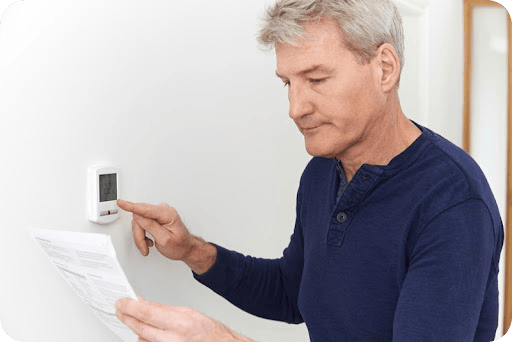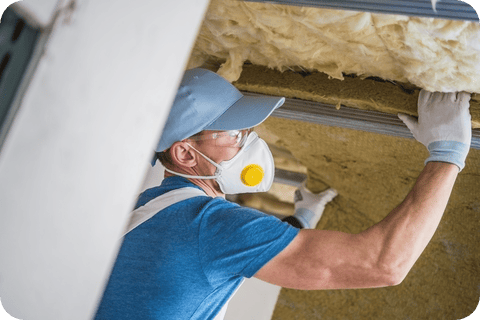How Much Electricity Does A Heat Pump Use?
 Understanding just how much electricity a heat pump uses can be a tricky thing. There are a few factors that play into the ultimate operating costs – such as energy consumption, the efficiency of the system, kWh usage, and your electricity source. But there are some general rules of thumb that we can utilize to make a fairly accurate assessment.
Understanding just how much electricity a heat pump uses can be a tricky thing. There are a few factors that play into the ultimate operating costs – such as energy consumption, the efficiency of the system, kWh usage, and your electricity source. But there are some general rules of thumb that we can utilize to make a fairly accurate assessment.
Here at Compass Heating and Air, we take pride in being able to answer these questions and more. Our goal is to help you get a better understanding of your system’s operating costs, energy consumption, and even the nitty gritty details of average running wattage and total wattage used for a heat pump vs a conventional furnace.
Conventional Heat Vs. Heat Pumps: Combustion Vs. Heat Transfer
Climate control in both commercial and residential applications is becoming more and more efficient. Newer methods of heating and cooling are more energy efficient than those of even a few years ago. Check out these comparisons:
Heat Pump Technology
A heat pump is an energy-efficient alternative to conventional heating systems. Unlike traditional methods, which rely on oil or natural gas combustion to produce heat, heat pumps use electricity to transfer heat from one place to another. This process makes heat pumps more environmentally friendly and cost-effective compared to systems that burn fossil fuels.
Air-Source Heat Pumps and Ground-Source Heat Pumps
There are two main types of heat pumps: air-source heat pumps and ground-source heat pumps. Air-source heat pumps extract heat from the outside air, while ground-source heat pumps, also known as geothermal heat pumps, take heat from the ground or a body of water. Both types provide heating and cooling, making them an all-in-one solution for maintaining a comfortable indoor temperature.
Heat Pumps As Air Conditioning
Heat pumps can also function as air conditioning systems during the warm months. They reverse the heat transfer process, extracting heat from the indoor air and releasing it outdoors. This keeps the indoor space cool and comfortable, eliminating the need for a separate air conditioning unit.
Read More: How Are Heat Pumps And AC Different?
Gas Furnace Vs. Heat Pumps
A gas furnace relies on burning natural gas to produce heat, which can be less efficient and less environmentally friendly compared to heat pumps. Heat pumps use electricity and heat transfer to maintain a comfortable temperature, lowering energy costs and carbon emissions.
Heat Pump Power Consumption
Heat pumps represent newer, more efficient technology utilizing less energy and saving you money in operating costs.
Heat Pump Electricity Usage: Size and Capacity
The power consumption of a heat pump largely depends on its size or capacity (tonnage). Heat pump sizes are usually measured in BTU output, which is the amount of heat the pump can produce.
Generally, the larger the capacity, the more electricity the heat pump will consume. For instance, a 4-ton heat pump will use more electricity than a 1-ton unit. It’s important to choose the right-sized heat pump based on the area you need to heat or cool. Undersized or oversized units can lead to inefficient comfort and higher energy costs
Heat Pump Power Consumption and Energy Efficiency Ratings
The energy efficiency of heat pumps is another critical factor that determines their power consumption. The more efficient the unit, the less electricity it will consume. There are three main energy efficiency ratings for heat pumps:
- SEER
- HSPF
- CoP
HSPF Explained
The Heating Seasonal Performance Factor (HSPF) is a rating system used to measure the efficiency of air-source heat pumps in heating mode. The higher the HSPF rating, the more efficient the heat pump is at converting electricity into heat during the heating season.
SEER Explained
The Seasonal Energy Efficiency Ratio (SEER) is a rating system used to measure the efficiency of heat pumps in cooling mode. A higher SEER rating means that the heat pump is more efficient at converting electricity into cooling during the cooling season.
It’s a good idea to compare SEER ratings when selecting a heat pump, as higher efficiency units can help reduce your energy usage and save on electricity bills. They also help lower your carbon footprint.
Coefficient of Performance (CoP)
The Coefficient of Performance (CoP) is another metric that indicates how efficient a heat pump is at converting energy into heat or cooling. A CoP rating above 1 indicates that the heat pump is efficient, meaning that it produces more heating or cooling power than the electricity it consumes.
The CoP rating can vary for air-source and ground-source heat pumps, with ground-source models generally having higher CoP ratings.
Heat Pump Types and Their Electricity Consumption
Heat pumps represent less energy consumption and more energy sources than traditional heating and cooling systems.
Read More: Installing A Ductless Heat Pump In Skokie, IL
Heat Pump Water Heaters
Heat pump water heaters use refrigeration technology to extract heat from the surrounding air and transfer it to the water in a storage tank. They are energy-efficient and can significantly reduce your water heating costs. The electricity consumption for a family of four using a heat pump water heater is around $15 per month.
Air-Source Heat Pumps
 Air-source heat pumps are the most common type of heat pump. They extract heat from the outside air and transfer it indoors during the heating season, and reverse the process for cooling. Their energy consumption depends on factors such as size, capacity, and efficiency, but in general, they can be more energy-intensive than ground-source heat pumps due to lower efficiency in extreme temperatures.
Air-source heat pumps are the most common type of heat pump. They extract heat from the outside air and transfer it indoors during the heating season, and reverse the process for cooling. Their energy consumption depends on factors such as size, capacity, and efficiency, but in general, they can be more energy-intensive than ground-source heat pumps due to lower efficiency in extreme temperatures.
Ground-Source Heat Pumps
Ground-source heat pumps, also known as geothermal heat pumps, use the stable temperature of the earth to provide heating and cooling for your home. These types of heat pumps are highly efficient and can result in lower electricity consumption compared to air-source heat pumps. However, they have higher upfront costs and require more extensive installation.
Types of Heat Pumps and Their Impact on Energy Consumption
The type of heat pump you choose can significantly affect your electricity consumption. In general, ground-source heat pumps offer the highest efficiency and lower energy consumption, followed by air-source heat pumps. Heat pump water heaters can also help to reduce your energy bills by providing hot water at a lower cost compared to traditional water heating methods.
Estimating the Operating Costs of a Heat Pump
While heat pumps are more efficient, their operating costs can vary from type to type depending on a number of factors.
Reading Your Electricity Bill
To estimate the operating costs of a heat pump, start by reading your electricity bill. This will provide you with the necessary information on electricity prices and your average electrical consumption. Pay close attention to the cost per kilowatt-hour ($/kWh), as this will help you calculate the cost to run your heat pump.
Measuring and Understanding Heat Pump Wattage
When estimating heating costs, it’s essential to understand the wattage of a heat pump. The wattage, or how many watts heat pumps use, directly impacts the amount of electricity consumed. You can find the wattage information in your heat pump’s specifications or by referring to the calculated kWh chart.
Calculating Heating kWh Usage and Expenses for Heat Pumps
Using the wattage of a heat pump, you can calculate the heating kWh usage and the running cost per hour, per day, and per month. To do this, you’ll need to refer to your heat pump’s BTUs and the electricity prices mentioned in your electrical bill.
For example, let’s assume a heat pump consumes 3,000 watts (3 kWh) and your electricity cost is $0.12/kWh. The running cost per hour would be 3 kWh x $0.12/kWh = $0.36. To calculate the daily cost, multiply this by the number of hours the heat pump operates per day. For monthly costs, multiply the daily cost by the number of days in the month.
Calculating Cooling kWh Usage and Expenses for Heat Pumps
 Calculating the cooling running cost for a heat pump follows a similar process. Again, refer to your heat pump’s wattage and the electricity prices from your electrical bill. Keep in mind that the cooling kWh usage might differ from the heating kWh usage, as the efficiency of heat pumps can vary between the two modes.
Calculating the cooling running cost for a heat pump follows a similar process. Again, refer to your heat pump’s wattage and the electricity prices from your electrical bill. Keep in mind that the cooling kWh usage might differ from the heating kWh usage, as the efficiency of heat pumps can vary between the two modes.
For example, let’s assume the heat pump consumes 2,500 watts (2.5 kWh) for cooling and your electricity cost is $0.12/kWh. The cooling running cost per hour would be 2.5 kWh x $0.12/kWh = $0.30. Multiply this by the number of hours the heat pump operates per day for the daily cost and by the number of days in the month for the monthly cost.
To get a comprehensive understanding of heat pump energy usage, you can refer to the US Energy Information Administration’s (EIA) Residential Energy Consumption Survey (RECS).
Energy Usage for Heat Pump Water Heaters
Heat pump water heaters represent an innovation in energy recycling and usage.
How Heat Pump Water Heaters Work
Heat pump water heaters harness electricity and refrigeration technology to heat water for household use. Unlike traditional water heaters that generate heat directly, heat pump water heaters extract heat from the surrounding air and transfer it to the water stored in their insulated tanks making them more efficient than conventional water heaters.
Energy Consumption of Heat Pump Water Heaters
The energy usage of heat pump water heaters depends on several factors, including the unit’s capacity, efficiency, and environmental conditions. However, these devices typically consume less electricity than traditional water heaters, resulting in lower utility bills for homeowners.
Advantages of Heat Pump Water Heaters
One of the primary benefits of using heat pump water heaters is their reduced energy consumption, which leads to lower electricity costs for homeowners. Additionally, they provide a consistent supply of hot water, ensuring that all household members have access to comfortable showers and baths. Heat pump water heaters are also environmentally friendly, as they rely on renewable energy sources and emit fewer greenhouse gasses than traditional water heaters.
Choosing the Right Heat Pump Water Heater
When selecting a heat pump water heater for your home, it’s essential to consider factors such as capacity, efficiency, and the unit’s compatibility with your existing plumbing system. Determining your family’s hot water needs will guide you in making the right choice.
Power Consumption Comparison: Heat Pump Vs. Furnace & Central Air
It is helpful to have a one to one comparison when determining which system offers real long term value. At Compass, Heating and Air, we have put together a few comparisons to help you understand where the long term value lies.
Heat Pump Energy Efficiency
When comparing the energy consumption of a heat pump to a traditional gas furnace and central air conditioning system, it’s important to understand the differences in efficiency. Heat pumps are more energy-efficient than gas furnaces and central air conditioning systems because they simply transfer heat, rather than generating it. This means that heat pumps use less electricity, resulting in lower energy bills.
Gas Furnace Energy Consumption
In contrast, gas furnaces generate heat by burning natural gas, which can lead to higher energy consumption and, consequently, higher utility costs. While gas furnaces are typically more efficient than electric furnaces, they still consume more energy than heat pumps. Additionally, furnaces only provide heating, which means you’ll need a separate central air conditioning system for cooling.
Central Air Conditioning Energy Consumption
Central air conditioning systems work by compressing refrigerants to cool the air in your home. Like gas furnaces, central air conditioning units are separate from heating systems and require additional energy to operate. They can also consume more energy than heat pumps, which can both heat and cool your home using a single, efficient system.
Benefits of Heat Pumps Over Conventional HVAC Systems
Heat pumps offer real long term benefits over conventional HVAC systems.
Enhanced Comfort
Heat pumps provide enhanced comfort by efficiently maintaining indoor temperatures in both warm and cold weather conditions. By leveraging renewable energy sources, heat pumps can effectively heat your home in the winter while also cooling it during the summer. This makes them an energy-saving alternative to traditional HVAC systems.
Reduced Energy Expenses
One of the most significant advantages of heat pumps is their efficiency. Due to their ability to transfer heat instead of generating it, they consume less energy than conventional heating and cooling systems. This translates to cost savings on your energy bills and a reduced impact on the environment. By using heat pumps, you can cut your energy consumption by up to 50% compared to traditional furnaces or baseboard heaters. This makes heat pumps a smart choice for homeowners who want to minimize their energy expenses and carbon footprint.
Flexible Installation Options
Heat pumps offer customizable installation options that can be tailored to suit the unique requirements of your home.
The three available types of heat pumps are: Air-source, ground-source and water-source models. Each type has its own set of advantages, and the most suitable option for your home will depend on factors such as your climate, available space, and desired energy efficiency.
Air-source heat pumps are the most common type. They transfer heat between the indoor and outdoor air. Ground-source heat pumps, also known as geothermal heat pumps, use the earth’s constant temperature to heat and cool your home. Water-source heat pumps utilize nearby bodies of water, such as lakes or ponds, as a heat source or sink.
By choosing the right type of heat pump for your home, you can optimize energy efficiency and minimize the impact on the environment. Heat pumps are a versatile and eco-friendly solution for homeowners looking to reduce their energy consumption and carbon footprint while maintaining a comfortable living space.
Top Five Ways to Decrease Heat Pump Operating Costs
Every homeowner can take these steps to ensure that their system is operating at maximum efficiency.
Insulating Your Home
 Improving your home insulation is crucial to reducing heat pump operating costs. Insulation prevents heat from escaping during winter and entering during summer, maintaining a comfortable indoor temperature and decreasing the energy load on your heat pump. Plus proper home insulation allows you to take advantage of rebates and tax credits for energy-efficient improvements.
Improving your home insulation is crucial to reducing heat pump operating costs. Insulation prevents heat from escaping during winter and entering during summer, maintaining a comfortable indoor temperature and decreasing the energy load on your heat pump. Plus proper home insulation allows you to take advantage of rebates and tax credits for energy-efficient improvements.
Accurate Load Calculation
An essential step to ensure efficient heat pump operation is proper load calculation. By determining the precise heating and cooling requirements of your home, you can choose a heat pump with the appropriate size and capacity. This avoids oversizing or undersizing, which can lead to higher energy consumption, inadequate temperature control, and increased wear on the compressor, outdoor and indoor fans, and other components.
Regular Filter Maintenance
Regular filter maintenance is vital for maintaining heat pump efficiency. Dirty filters restrict airflow, forcing your heat pump to work harder and consume more electricity. By cleaning or replacing your filters every three months, you can enhance your heat pump’s performance, improve indoor air quality, and extend its lifespan.
Using a Programmable Thermostat
A programmable thermostat can significantly decrease heat pump operating costs by automatically adjusting the temperature based on your preferences and outdoor temperature. By setting your thermostat to maintain a comfortable temperature only when you are at home, you reduce heating and cooling demands and save.
Using Window Curtains
Window curtains can play a significant role in heat pump efficiency. During winter, close curtains at night to prevent heat from escaping through windows, and open them during the day to let in sunlight for natural heating. In summer, use curtains to block direct sunlight and reduce the cooling load on your heat pump. Especially in rooms you aren’t using!
Regular Professional Maintenance
Scheduling regular professional maintenance is essential for optimizing your heat pump’s performance and prolonging its lifespan. A qualified technician can inspect, clean, and repair components such as the compressor, fans, and refrigerant levels to ensure your heat pump operates at peak efficiency. Regular professional maintenance can also help identify potential issues early, preventing costly repairs and reducing electricity consumption.
Combining Solar Energy with Heat Pumps for Reduced Electricity Consumption
Solar Energy and Heat Pumps: A Perfect Match
When you combine solar energy with heat pumps, you create a powerful and eco-friendly solution to your heating and cooling needs. Solar panels can be installed on your roof, working in tandem with your heat pump to generate electricity from the sun, reducing your reliance on the grid.
Power Outage Protection
In case of a power outage, having a solar-powered heat pump can be a lifesaver. With the electricity generated by your solar panels, your heat pump can continue to function even when the grid is down. This ensures your home stays comfortable during a blackout, providing both heating and cooling when needed.
Location and Solar Energy Efficiency
The efficiency of your solar panels and their ability to generate electricity for your heat pump depends on your location. According to the US Department of Energy (DOE), certain regions receive more sunlight than others, leading to higher solar energy production. For optimal performance, consult with a professional to determine the best placement for your solar panels.
DOE Support for Solar and Heat Pump Integration
The US DOE actively supports the integration of solar energy with heat pumps. They provide resources and information to help homeowners make informed decisions about solar panel system installation and heat pump usage. By using solar energy to power your heat pump, you’ll contribute to a greener and more sustainable future.
Backup Generator for Added Security
While solar panels and heat pumps offer a reliable and energy-efficient solution, it’s always a good idea to have a backup plan.
Installing a generator as a secondary power source can ensure your home stays warm during extreme weather conditions or if your solar panels are not generating enough electricity. With a backup generator in place, you can have peace of mind knowing your home will remain comfortable no matter the circumstances.
FAQs
Our Compass Heating and Air technicians have put together some short answers to these frequently asked questions.
Do heat pumps use a lot of electricity?
Compared to conventional furnaces, heat pumps use less energy and are more efficient.
How many watts does a heat pump use?
On average, an air source heat pump uses anywhere from 545 watts to 7,500 watts of electricity.
How much does a heat pump cost to run?
Assuming a heat pump consumes 3,000 watts (3 kWh) and your electricity cost is $0.12/kWh. The running cost per hour would be 3 kWh x $0.12/kWh = $0.36. To calculate the daily cost, multiply this by the number of hours the heat pump operates per day. Expert air conditioner service in Elgin, IL
Call Compass Heating and Air at (630) 504-8688, for expert air conditioner service in Elgin, IL.


